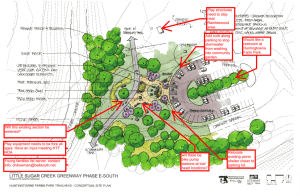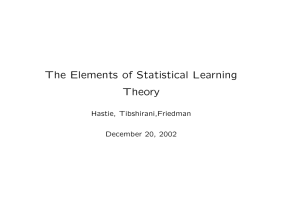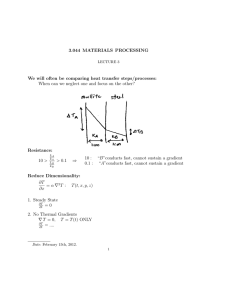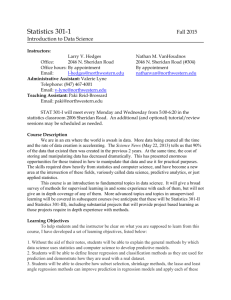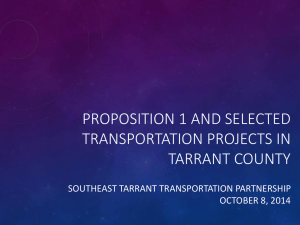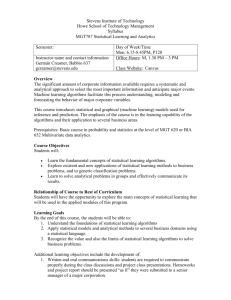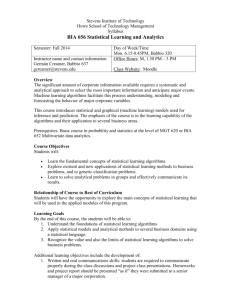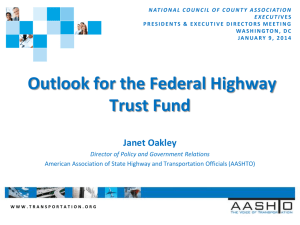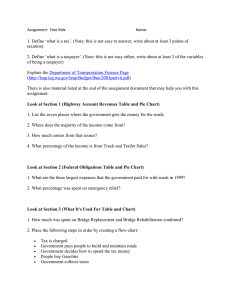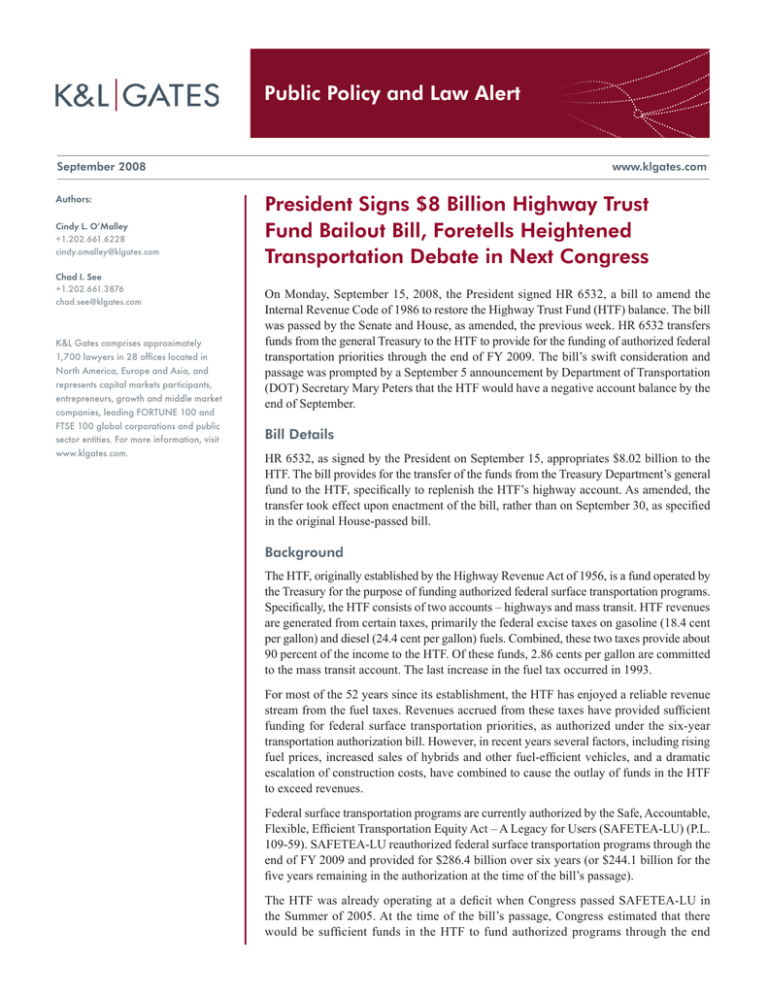
Public Policy and Law Alert
September 2008
Authors:
Cindy L. O’Malley
+1.202.661.6228
cindy.omalley@klgates.com
Chad I. See
+1.202.661.3876
chad.see@klgates.com
K&L Gates comprises approximately
1,700 lawyers in 28 offices located in
North America, Europe and Asia, and
represents capital markets participants,
entrepreneurs, growth and middle market
companies, leading FORTUNE 100 and
FTSE 100 global corporations and public
sector entities. For more information, visit
www.klgates.com.
www.klgates.com
President Signs $8 Billion Highway Trust
Fund Bailout Bill, Foretells Heightened
Transportation Debate in Next Congress
On Monday, September 15, 2008, the President signed HR 6532, a bill to amend the
Internal Revenue Code of 1986 to restore the Highway Trust Fund (HTF) balance. The bill
was passed by the Senate and House, as amended, the previous week. HR 6532 transfers
funds from the general Treasury to the HTF to provide for the funding of authorized federal
transportation priorities through the end of FY 2009. The bill’s swift consideration and
passage was prompted by a September 5 announcement by Department of Transportation
(DOT) Secretary Mary Peters that the HTF would have a negative account balance by the
end of September.
Bill Details
HR 6532, as signed by the President on September 15, appropriates $8.02 billion to the
HTF. The bill provides for the transfer of the funds from the Treasury Department’s general
fund to the HTF, specifically to replenish the HTF’s highway account. As amended, the
transfer took effect upon enactment of the bill, rather than on September 30, as specified
in the original House-passed bill.
Background
The HTF, originally established by the Highway Revenue Act of 1956, is a fund operated by
the Treasury for the purpose of funding authorized federal surface transportation programs.
Specifically, the HTF consists of two accounts – highways and mass transit. HTF revenues
are generated from certain taxes, primarily the federal excise taxes on gasoline (18.4 cent
per gallon) and diesel (24.4 cent per gallon) fuels. Combined, these two taxes provide about
90 percent of the income to the HTF. Of these funds, 2.86 cents per gallon are committed
to the mass transit account. The last increase in the fuel tax occurred in 1993.
For most of the 52 years since its establishment, the HTF has enjoyed a reliable revenue
stream from the fuel taxes. Revenues accrued from these taxes have provided sufficient
funding for federal surface transportation priorities, as authorized under the six-year
transportation authorization bill. However, in recent years several factors, including rising
fuel prices, increased sales of hybrids and other fuel-efficient vehicles, and a dramatic
escalation of construction costs, have combined to cause the outlay of funds in the HTF
to exceed revenues.
Federal surface transportation programs are currently authorized by the Safe, Accountable,
Flexible, Efficient Transportation Equity Act – A Legacy for Users (SAFETEA-LU) (P.L.
109-59). SAFETEA-LU reauthorized federal surface transportation programs through the
end of FY 2009 and provided for $286.4 billion over six years (or $244.1 billion for the
five years remaining in the authorization at the time of the bill’s passage).
The HTF was already operating at a deficit when Congress passed SAFETEA-LU in
the Summer of 2005. At the time of the bill’s passage, Congress estimated that there
would be sufficient funds in the HTF to fund authorized programs through the end
Public Policy and Law Alert
of FY 2009. However, by this year both the Office
of Management and Budget and the Congressional
Budget Office agreed that cash balances in the highway
account would be operating in a deficit by the end of
FY 2009.
In the FY 2009 budget request, the Administration
forecasted a $3.1 billion shortfall to the highway
account and proposed transferring $3.2 billion from the
mass transit account to the highway account to avoid
such a shortfall. The request also called for $1.8 billion
less in FY 2009 funds than is authorized for federal
highway programs under SAFETEA-LU. About $1
billion of the reduction was a result of revenue-aligned
budget authority (RABA) provisions dictating that
if fuel tax revenues are lower than estimated when
the law was written, then spending is supposed to be
reduced. Since, according to Administration estimates,
fuel tax receipts have been less than expected the past
two years, RABA dictated a reduction in highway funding.
Congress rejected the Administration’s transfer
proposal and instead pursued alternatives that would
both provide additional funds to the highway account
over the Administration’s proposal and not draw from
the mass transit account, which Congress deemed
critical to protect in the interest of funding future public
transportation priorities. In April, the Senate Finance
Committee reported out a measure, the American
Infrastructure Investment and Improvement Act,
that would immediately replenish the HTF with $3.4
billion from Treasury’s general fund and provide over
$1.5 billion in additional funds by other means over
the next 10 years (this legislation was also reported
out by the committee in 2007). However, efforts to
pass this measure stalled largely due to Republican
opposition and concerns about separate legislation
(e.g., FAA reauthorization) to which the HTF language
was attached.
In July, the House introduced and passed (on July 23) its
initial version of HR 6532, which was nearly identical
to the version of the bill signed by the President last
week. Specifically, the bill proposed transferring $8.02
billion from the Treasury’s general fund to the HTF to
fund authorized programs through FY 2009. Supporters
of the bill cited a need for the funds to provide for
authorized programs over the next fiscal year and
contended that the transfer would replace the $8 billion
that was transferred out of the HTF in 1998, when there
was a large unspent balance and a need for funding
in other federal programs. Following passage in the
House, Senate Majority Leader Harry Reid (D-NV)
attempted to secure Senate passage by unanimous
consent prior to the August recess, but efforts were
blocked by Republicans objecting to the bill.
On September 5, DOT Secretary Mary Peters
announced that the highway account would be expended
by September 30 if no action was taken to infuse the
account with new funds. While the DOT is expecting
the HTF to receive $2.7 billion in fuel tax receipts in
September, new Administration estimates show that the
fund faces $4.4 billion in requests for reimbursements.
Secretary Peters, in a reversal of the Administration’s
earlier position, called on Congress to pass its $8 billion
bailout plan by September 12 to prevent states from
being adversely affected. Until Peters’ announcement,
the Administration had contended that “the measure
would unnecessarily increase the deficit and would
place any hope of future, responsible constraints on
highway spending in jeopardy.”
Swift Action to Enact
Secretary Peters’ comments on the HTF and support
for HR 6532 led to swift action in Congress. Directly
following Peters’ statement, Democratic leaders in
Congress renewed efforts to secure passage of HR
6532, setting aside other priorities. On September
9, Majority Leader Reid again attempted to seek
passage in the Senate by unanimous consent, but was
initially blocked by Republicans interested in offering
amendments to the bill. Opponents included Sen. Judd
Gregg (R-NH), the ranking member of the Senate
Budget Committee, who sought to subject the funding
transfer to pay-as-you-go budget rules and to reinstitute
the previous version of the Harry Byrd Test, which
requires a reduction in obligations from the HTF if
there are insufficient funds. However, by September
10, Gregg and other opponents had relented, allowing
for the Senate to pass the bill by voice vote. One
amendment was attached to the bill, making the bill
effective immediately following enactment, rather
than on September 30. On September 11, the House
agreed to the Senate amendment and passed the bill, as
amended. President Bush signed the bill on September 15.
Looking Ahead
The need for immediate action to replenish the HTF
is heightening an already much anticipated upcoming
debate on federal transportation funding. Factors
contributing to the funding shortfall this month (e.g.,
September 2008 | 2
Public Policy and Law Alert
gas prices, fuel-efficient vehicles, construction costs)
are unlikely to subside in the next year (or more),
making it very likely that additional shortfalls will
continue in the future if dramatic changes aren’t
instituted to compensate for this new reality. At the
same time, federal, state, and local jurisdictions have
been warning (for several years) of a critical need
for transportation infrastructure, modernization and
replacement in the next six years (and beyond), as
roads, bridges, and other infrastructure some of which
was constructed more than 100 years ago, deteriorate
or become obsolete. As a result, the debate on the
HTF, while to be centered around the transportation
re-authorization bill, is likely to transcend the debate
on the transportation bill in the next Congress as
Members attempt to identify all potential opportunities
for funding federal transportation priorities. Examples
of issues likely to be touched by concerns over the
HTF include the anticipated debates on tax and
energy policy.
Debate on the reauthorization of SAFETEA-LU is
expected to begin in earnest at the beginning of the new
Congress. Already, House and Senate transportation
authorizing committees, particularly the House
Transportation and Infrastructure Committee and the
Senate Environment and Public Works Committee,
have been holding discussions to determine federal
priorities in the authorization bill. However, it’s clear
that the HTF is already the number one priority for the
bill, as all funding for other priorities is determinant
on finding a solution to revenue shortfalls in the HTF.
Formal markup of a bill by committees is expected to
begin by early Spring next year. It’s possible that a bill
may see passage by the end of September 2009, when
SAFETEA-LU expires. If not (or perhaps even if it is)
an additional HTF bailout bill may be needed to provide
for funding of federal transportation programs.
K&L Gates comprises multiple affiliated partnerships: a limited liability partnership with the full name K&L Gates LLP qualified in Delaware and
maintaining offices throughout the U.S., in Berlin, in Beijing (K&L Gates LLP Beijing Representative Office), and in Shanghai (K&L Gates LLP Shanghai
Representative Office); a limited liability partnership (also named K&L Gates LLP) incorporated in England and maintaining our London and Paris offices;
a Taiwan general partnership (K&L Gates) which practices from our Taipei office; and a Hong Kong general partnership (K&L Gates, Solicitors) which
practices from our Hong Kong office. K&L Gates maintains appropriate registrations in the jurisdictions in which its offices are located. A list of the
partners in each entity is available for inspection at any K&L Gates office.
This publication/newsletter is for informational purposes and does not contain or convey legal advice. The information herein should not be used or
relied upon in regard to any particular facts or circumstances without first consulting a lawyer.
Data Protection Act 1998—We may contact you from time to time with information on K&L Gates LLP seminars and with our regular newsletters,
which may be of interest to you. We will not provide your details to any third parties. Please e-mail london@klgates.com if you would prefer not to
receive this information.
©1996-2008 K&L Gates LLP. All Rights Reserved.
September 2008 | 3

